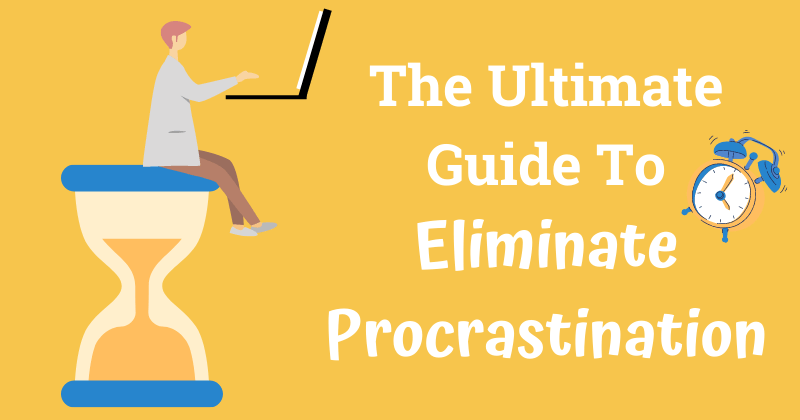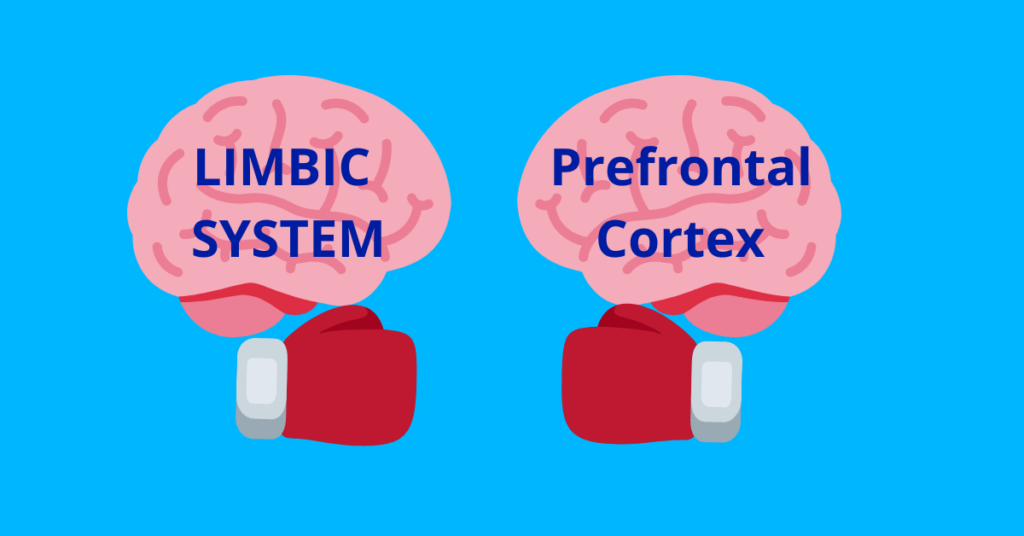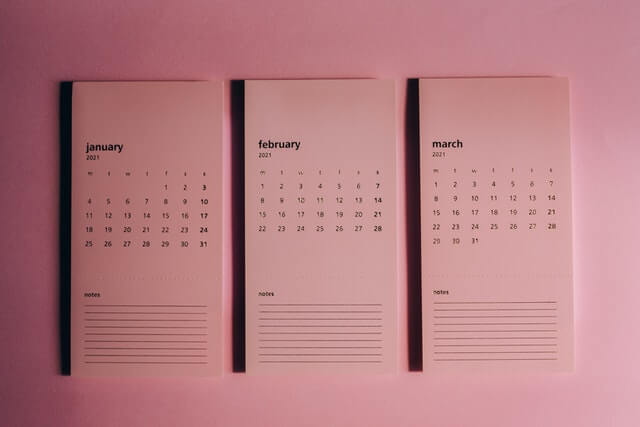The Ultimate Guide To Eliminate Procrastination

This article may contain affiliate links. If you make a purchase using my links, I’ll earn a small commission at no extra cost to you. I appreciate your support!
What is Procrastination?
Procrastination is a challenge we all face in our day-to-day lives. From hitting the snooze button to going to the gym to eating healthy food.
Anything considered good for your personal development, which you delay for a later time is procrastination working at full potential.
In simple words, procrastination means delaying or postponing something important.
As long as people live, procrastination will continue to hinder our productivity.
Don’t you worry, even I am a procrastinator, I love to relax and avoid working (we all do, don’t we?).
The purpose of this topic is to break the science behind why we procrastinate and how to put your best efforts into eliminating procrastination.
Finally, let’s talk about the 7 ways you can stop procrastinating starting Today!
According to Wikipedia, “Procrastination is the avoidance of doing a task that needs to be accomplished by a certain deadline”
The Science Behind Why We Procrastinate
Okay, Wikipedia is great but why do we procrastinate? What happens to that brain of ours that lets us delay our important tasks to waste time?
And why do we need to know the science behind it?
Well, Sun Tzu, a Chinese General in the 6th century BCE said “Know Thy Enemy”.
So let us obey his sayings and understand the science behind procrastination.
Imagine a tug of war, not between you and your friend. A tug of war between two parts of your brain – Your Limbic System and Your Prefrontal Cortex. Your Limbic system is a bit stronger than your Prefrontal cortex.

The Limbic system works on autopilot. It triggers emotions and wants you to stop doing things that make you unhappy and opt for things that give you instant gratification.
The Prefrontal Cortex controls planning, decision making, and improves personality development. It wants you to get your sh*t together but is not as developed as the limbic system.
It’s not on autopilot and to activate it, you need to get the task started (I am going to the gym right now). Now when you’re stressed or lazy, you feel a sense of discomfort and your body runs to autopilot. Your limbic system defeats your prefrontal cortex leading to procrastination.
Another phenomenon we face right when we do our work is “Time inconsistency”.
Time consistency is letting the brain know that there is an immediate reward for action and a future reward for an action.
The brain then decides to choose the immediate reward as it increases the secretion of mesolimbic dopamine in the brain.
Our tasks and goals are always based on future rewards and thus we end up Procrastinating.
Imagine you want to lose weight, this is your long-term goal which gives you Future rewards. You are dreaming about what your life would be like in the future. This motivates the brain to set goals and structure.
But to take action and start your fit life, you need to trigger something which tells your brain to start. Now as there is no instant gratification in performing a difficult thing, so your brain delays this and shifts to something which provides it with the immediate satisfaction it needs.
Basically, it stops you from doing a particular task by creating obstacles that ensure your task is delayed.
This is why you might go to sleep feeling motivated but when you wake up, you find yourself following the same old pattern you shouldn’t be following.
Your brain values long-term benefits when it’s in the future (tomorrow) but it gives priority to instant gratification in the present (today).
8 Ways To Eliminate Procrastination
1. The Join Forces Strategy (JFS)
The join forces strategy is quite simple, yet very effective. All you gotta do is merge your long-term goal with instant gratification and do the task.
- Your long term goal is to start gyming, so when you go to the gym listen to songs (instant gratification).
- Your long term goal is to do your homework, so pair it up with ice cream (instant gratification).
The strategy is easy to follow:- your goal + your instant gratification.
Pair them up and you will see that now you have a reason to get the work done as your brain is being tricked into getting excited.
2. Align your goals with your friend

If you start working out consistently, there will be an improvement in your habits. But what if you don’t go to the gym one day a week when you actually should be going?
You won’t care as missing one workout session won’t result in massive losses in terms of health and physique.
However, what if you workout with a friend and then if you miss a workout without a valid reason – You’ll look like a stupid person.
Your brain doesn’t want that and thus it ensures you don’t skip and don’t procrastinate.
3. Be a Minimalist
What do you do when you procrastinate? Eat junk, use your phone, watch videos, browse social media, sleep?
A great technique to stop procrastinating is to become a minimalist.
When you’re doing a certain task, make sure your environment speaks the task. What I mean is that, if your phone is not required for the particular task, put it on silent and lock it in a cupboard.
Don’t work near our bed as you might be tempted to sleep. Make sure your fridge (or wherever you keep junk food) is not within your eye’s direct reach.
When I sit to write a blog, I only have my laptop, my laptop charger, and my phone (because I use my phone when I write).
I even keep my water bottle with me on the table where I write because I know if I get up to drink water, I’ll be tempted to munch on junk easily.
Keeping fewer things in your vicinity also keeps your mind clear and focused on work.
4. Break down your long term goals
Remember how we discussed the prefrontal cortex and limbic system? Well, we need to ensure the limbic system doest take over.
By reducing stress and shortening our goals, we can achieve this. If you keep your goals big and unachievable, you’re easily going to shift to procrastinating in no time.
Breaking down the goals into smaller more achievable tasks will make sure you don’t fall for temptations easily and get the work done. This will also strengthen your prefrontal cortex which helps you to get your tasks done in the future.
5. Create a To-Do List
You procrastinate because you’re confused and your brain hates confusion so you delay the task. If you already know what you’re going to do in advance, you have a set structure to follow and work on a day-to-day basis.
Creating a To-Do list helps you to curb your temptations to procrastinate and get you to hustle on your goals.
Check out my in-depth article on the 17 Best Task Management Apps (To-do List Apps), pick one that you’re most comfortable with, and finish your tasks every day!
Don’t add a lot of things to your list. Keep it short and to the point. Otherwise, you probably won’t get it done.
Just don’t forget to tick all your tasks as soon as you finish them. It acts like a small treat that helps you complete further tasks.
6. The Seinfeld Strategy

Who is Seinfeld? Jerry Seinfeld is an extremely famous American comedian. He is regarded as the “Top 100 comedian of all time” by Comedy Central.
His strategy is simple: take a calendar, a green marker, and a red marker. Each day you complete your daily tasks and not procrastinate, mark an “X” on the calendar with the red marker. Continue doing this for an entire month, then an entire year.
Your only focus should be to not use the green marker meaning you don’t have to break the chain of a red X on the calendar.
He doesn’t speak about how to avoid procrastinating but just tells us to focus on putting an X with the red marker every day and not break the chain.
Slowly this will urge you to not break the chain and you will never stop doing your work. This is a very effective strategy everyone should try.
What if you break the chain? Then start over. Don’t give up
7. The 5 Second Rule
This rule is simple and very effective – The moment you have a feeling to get started working on your goal, you must act immediately or you will lean into procrastination.
Say “5.4.3.2.1 Let’s Go To Work” and just get up and do the work. The more you think, the more your mind will force you into procrastinating.
If you’re sleeping and you want to get up to complete your project but you can’t because your mind isn’t letting you say “5.4.3.2.1. Let’s Go Do The Project” and immediately get up and start your project. The Rule will only work if “YOU DON’T THINK” isn’t that cool!
A productivity technique that only works if you don’t think, now that’s just awesome.
So next time you feel like working but your mind stops you “5.4.3.2.1 Let’s ___” and get going without thinking.
8. Finish your most difficult tasks first
The faster you finish your important tasks, the better it is. In your daily To-do List, put the tasks which are the most difficult and important to be scheduled right away.
Also, you’re most productive when you start working so doing the most important tasks first in your most productive time is the perfect way to accomplish your tasks nicely.
Schedule the other tasks only when you finish your important tasks.
Once the difficult tasks are completed you will feel motivated and you won’t end up leaving the small tasks which are pending.
Why is procrastination Bad for you?
1. You lose precious time
Isn’t that right? How many times in a day do you procrastinate?
Just imagine the time you waste and the work you could have accomplished if you just tried to push a bit more. The terrible thing is you can’t turn back the time you lost, all you can do is regret and hope you don’t repeat it.
Don’t be the guy who cannot achieve his goals, take the first step!
2. It leads to poor academic performance
A study conducted by WCPCG-2010 determined that students who procrastinated were unable to complete their work in time due to illness, family and social problems, overconfidence, laziness, lack of motivation, and tons of other problems.
Poor academic scores can also create arguments with your parents and teachers. It can have severe consequences if not handled immediately.
3. Increased Stress
Procrastination can lead to increased stress which leads to an increase in cortisol levels. A spike in cortisol level can lead to high blood pressure, rapid weight gain, muscle weakness, etc. Increased stress can also lead to depression and anxiety.
Some tips to reduce stress:
- Get more sleep.
- Avoid procrastinating your goals.
- Start exercising.
- Talk to someone.
- Take a break.
- Watch a comedy series.
- Have a healthy diet.
4. Low Self-esteem
We often procrastinate when we have low self-esteem.
Maybe you didn’t get good grades or you wanted to win that tournament but lost. We think by delaying our work we might be able to get our self-esteem high again, but in fact, it reduces our self-esteem even more causing us to feel demotivated and pathetic.
It kills your confidence, slowly and steadily making you feel miserable.
Focus on boosting your confidence and boosting your self-esteem.
How To Stop Procrastination?
Let’s sum up all the points on how to eliminate procrastination.
- Finish off your most difficult tasks first
- Reduce your stress
- Use the 5-second Rule
- Give the Seinfeld strategy a try
- Pair up with your friends on a particular goal
- Break down your goals
- Use a to-do list
- Create a minimalistic environment
- Add an instant gratification tool to your goal.
Practicing these tricks and techniques will surely ensure you won’t procrastinate.
But you could still end up procrastinating right?
When that happens get back to these guides and re-read these points and again try eliminating procrastination.
Have you enjoyed this post? If so, you might want to subscribe to my newsletter. It usually contains life lessons and money-related topics, some interesting observations, links to articles or books I’ve read, and tips to be a better person. If you’re interested in these things then subscribing will be simply wonderful 🙂 PS: Subscribe and Get your Freebie below!
Also, I’m a YouTuber now! If you’re interested in Pinterest Marketing, Blogging, or business-related things, Subscribe to my Channel and I’ll see you in the comments!
Hi Rylan,
i think the joint forces strategy could work for me!, knowing that i have a reward waiting for me behind every task is a really good feeling, it makes me think about the only reward while doing the task, this way all i really want is the reward, the task is just a means to an end.
I will be trying it out!
Great tip!
Hey Jennifer,
Joint force strategy is one of my favorite ones cause it really gets me productive. But after a point of time, even this strategy reduces its value. At that time, you’ll have to learn to be productive by being disciplined to your work. Focus and discipline can help you grow.
Thanks and have a great day 🙂